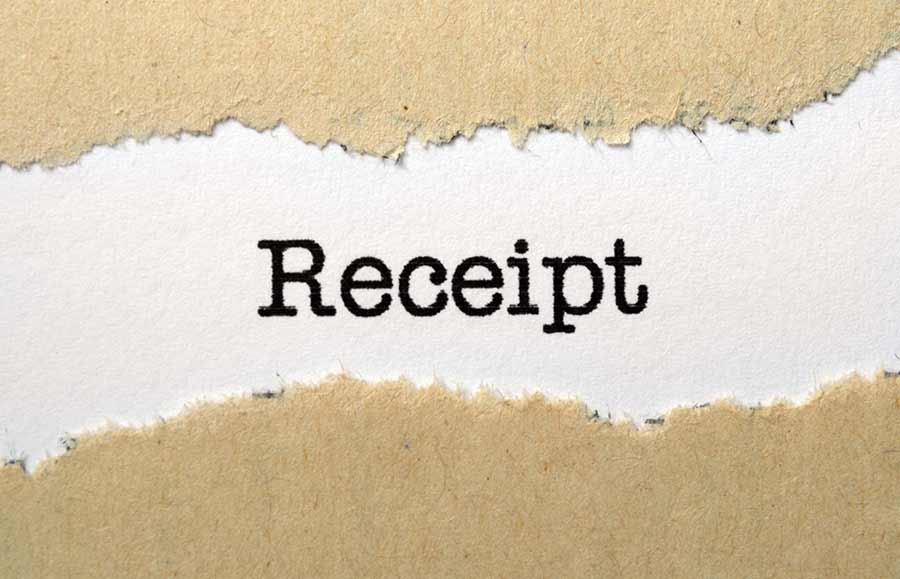If you’re looking for ways to trim your tax bill, itemizing your deductions can potentially reduce what you owe to Uncle Sam. Depending on your situation, you may be able to deduct medical expenses, charitable donations or job-related expenses. If you’re thinking of taking advantage of these or other deductions this tax season, accurate records are a must. The IRS has specific requirements for receipts that you’ll need to follow to make sure your deductions count.
Business Expenses
The IRS offers a tax break for certain out-of-pocket expenses related to your job. Some of the things you may be able to deduct include:
- Travel expenses
- Education or job training expenses
- Uniforms, tools, and equipment, including computers or office equipment
- Professional Dues
- Expenses related to maintaining a home office
If your job involves travel, the IRS has specific guidelines regarding the types of records you’ll need. According to Publication 463, any evidence you use to support a deduction must be “documentary” and “adequate”, meaning it must be written and show the date, place, amount and nature of the expense. Examples of the types of documentary evidence you can use to support your deduction include mileage logs, credit card receipts, bank statements, taxi and toll receipts, receipts for gifts and receipts from gas stations, hotels, and restaurants. The IRS allows an exception to this rule if your hotel expenses are less than $75, you have travel expenses for which a receipt is not readily available or you keep track of your expenses through an accountable plan with your employer.
If you’re self-employed, you’ll need to keep receipts for any business-related expense you incur, no matter how small. If you plan to claim the home office deduction, you’ll also need to keep detailed records regarding your home, including any costs you pay for property tax, rent, mortgages, utilities and repairs. You should also maintain detailed records if you’re paying out-of-pocket costs for your health insurance or other medical expenses.
Medical Expenses
For your 2012 taxes, the IRS allows you to deduct qualifying medical expenses that are more than 7.5% of your adjusted gross income (AGI). For the year 2013, this number moves from 7.5% to 10%. Eligible expenses include things like health insurance or long-term care insurance premiums, prescription drug costs, lab fees, and in-home nursing care. Generally, you can deduct these and other medical expenses for yourself, your spouse or your dependents. You can’t claim deductions for cosmetic procedures or for expenses that you received reimbursement for from your insurance company or employer. If you think you may be eligible for a deduction, the IRS encourages you to keep a written record including the date and amount of the expense and the name and address of who it was paid to. According to Publication 502, you should also keep a record of what type of care was received, what the purpose of the care or treatment was and who the expense was for.
Charitable Donations
Donating money, clothing or other items to charity is a great way to give back to the community while reducing your tax liability. As of 2013, the IRS allows you to claim a deduction for charitable donations equaling up to 50% of your adjusted gross income. The types of receipts you’ll need to keep depend on the amount of the donation and what was donated. Keep in mind that you can’t deduct donations to individuals or to nonqualified organizations, personal expenses, the value of your time or services and any contributions from which you receive a benefit.
According to Publication 526, deductions for cash donations of any amount require you to have a credit card statement, bank statement, canceled the check or a receipt from the charity specifying the date of the donation, the amount and who the money was donated to. For donations of more than $250, you’ll also need a written statement describing the amount and date of the donation and any benefit you received as a result.
For donations of clothing, household goods or other property valued at less than $500, you’ll need to get a receipt showing the name of the charity, the date of the donation and a reasonable description of the property. You should also keep records showing the fair market value of the item at the time you acquired it and at the time it was donated. If you’re donating items valued at more than $500 but less than $5,000, you’ll need all of the above as well as a description of how you got the property. Donations for items valued at more than $5,000 also require a professional written appraisal.
Additional Guidelines
As a general rule, the IRS advises taxpayers to maintain records for at least three years following their tax filing. If you file early, the three-year limitations period begins on the annual filing deadline. No records are necessary if you claim the standard deduction but you could end up owing more in taxes. Even if you don’t plan on itemizing, it’s still a good idea to keep a paper trail so you can compare your deductions before you file.



Leave a Reply
You must be logged in to post a comment.